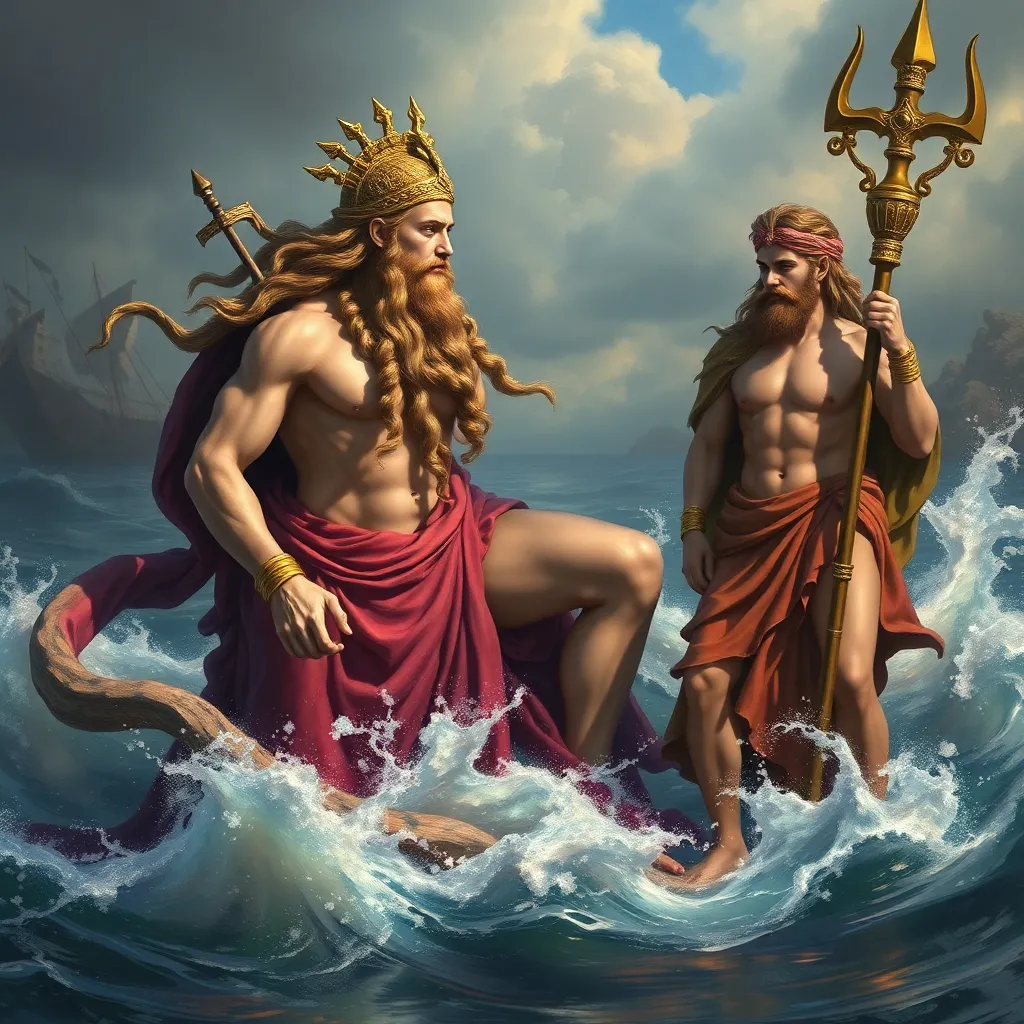Exploring Poseidon’s Relationships with Other Olympian Gods
I. Introduction
Poseidon, one of the twelve Olympian deities, is often depicted as the god of the sea, earthquakes, and horses. His significance in Greek mythology is profound, not only for his dominion over water but also for his complex relationships with other gods. The interactions among the gods shape the narratives of Greek mythology, illustrating themes of power, rivalry, and cooperation. This article aims to delve into Poseidon’s interactions with his fellow Olympians, shedding light on how these relationships influenced their stories and the wider mythological tapestry.
II. Poseidon and Zeus: Brothers in Power
Poseidon and Zeus are brothers, both born from the Titans Cronus and Rhea. Their shared lineage sets the stage for a dynamic relationship characterized by both cooperation and rivalry.
- The Origins of Their Relationship: Poseidon, Zeus, and Hades are the three brothers who divided the universe after overthrowing their father. Zeus took the sky, Poseidon the sea, and Hades the underworld.
- Dynamics of Power: While Zeus is often seen as the king of the gods, Poseidon holds significant power as the god of the sea. This dynamic sometimes leads to tension, especially in matters of authority.
- Cooperation During the Titanomachy: During the Titanomachy, the war between the Olympians and Titans, Poseidon and Zeus fought side by side, demonstrating their ability to collaborate when facing common enemies.
III. Poseidon and Hades: The Underworld Connection
The relationship between Poseidon and Hades is defined by their roles in the division of the cosmos and their respective domains.
- The Division of Realms: After their father’s defeat, each brother claimed dominion over a realm: Poseidon ruled the seas, Hades the underworld, and Zeus the heavens.
- The Nature of Their Relationship: Although Hades and Poseidon had distinct realms, they shared a bond as brothers, often collaborating on matters that affected both domains.
- Conflicts and Alliances: Conflicts occasionally arise, particularly when it comes to souls of the deceased crossing into the sea or issues relating to the living and the dead.
IV. Poseidon and Athena: The Contest for Athens
The rivalry between Poseidon and Athena is famously encapsulated in the myth of their competition for the patronage of Athens.
- Overview of the Myth: Poseidon struck the ground with his trident, creating a saltwater spring, while Athena offered the olive tree, a symbol of peace and prosperity. The citizens favored Athena’s gift, which led to her becoming the city’s patron.
- Analysis of Methods: Poseidon’s method was more destructive and primal, while Athena’s was beneficial and nurturing, reflecting their differing philosophies.
- Implications of the Outcome: The outcome soured their relationship, with Poseidon harboring resentment towards Athena, leading to a rivalry that would echo throughout their mythological narratives.
V. Poseidon and Demeter: The Search for Persephone
The relationship between Poseidon and Demeter is highlighted during the abduction of Persephone, Demeter’s daughter.
- The Connection: Poseidon and Demeter share a connection through their roles in the natural world, with Poseidon influencing the seas that surround the fertile lands of Demeter.
- Joint Efforts: When Hades abducted Persephone, Poseidon aided Demeter in her search, showcasing a moment of unity among the gods.
- Impact of the Event: This event solidified Poseidon’s reputation as a powerful ally, enhancing his standing among the gods by demonstrating his willingness to help his fellow deities.
VI. Poseidon’s Role with Other Olympian Gods
Poseidon’s relationships extend beyond his immediate family, involving various lesser-known Olympian deities.
- Relationships with Lesser-Known Deities: Poseidon interacts with gods like Hera, Hermes, and Apollo, often in ways that reflect both collaboration and conflict.
- Collaboration and Conflicts: For instance, he sometimes works alongside Hermes to protect sailors or clashes with Hera over control of certain territories.
- Influence on Divine Activities: Poseidon’s influence is pervasive, affecting various realms such as agriculture, navigation, and even divine politics.
VII. Poseidon’s Relationships with Mortals and Their Impact on Olympian Dynamics
Poseidon’s interactions with mortals have significant implications for his relationships with other Olympians.
- Interactions with Heroes: Poseidon is often involved with heroes like Odysseus, whom he both aids and hinders, showcasing the dual nature of his relationships.
- Affect on Standing: Mortal worship and legendary stories about Poseidon shape how other gods view him, influencing his status among the Olympians.
- Role of Mortal Worship: The reverence given to Poseidon by sailors and coastal communities further entrenches his influence and power within the pantheon.
VIII. Conclusion
In summary, Poseidon’s relationships with other Olympians are intricate and multifaceted, reflecting a balance of rivalry, cooperation, and the shared responsibilities of the gods. These interactions not only enrich his character but also enhance the overall narrative of Greek mythology. The dynamics between Poseidon and his fellow deities illustrate the complexities of power, allegiance, and the everlasting influence of the gods in ancient Greek culture. Today, Poseidon remains a powerful symbol of the sea and its mysteries, continuing to inspire stories and representations in modern culture.




